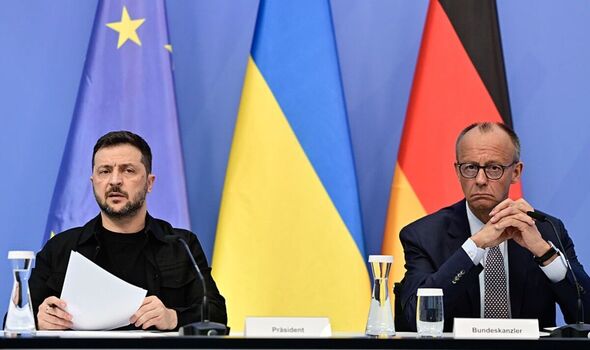World
Germany Pressures Ukraine to Halt Young Men’s Exodus Amid War

Germany’s Chancellor, Friedrich Merz, has urged Ukrainian President Volodymyr Zelensky to take measures to stop the increasing number of young Ukrainian men fleeing the country to Germany. This plea follows a recent change in Ukrainian exit regulations, which relaxed restrictions for men under the age of 25. Previously, all men aged 18 to 60 were prohibited from leaving Ukraine due to military conscription requirements, but this policy was modified at the end of August 2023.
The adjustment has led to a significant rise in the number of young Ukrainian men arriving in Germany. According to data from the German Interior Ministry, the weekly influx surged from just 19 individuals in mid-August to between 1,400 and 1,800 by October 2023. Merz communicated his concerns in a telephone conversation with Zelensky, emphasizing the importance of these young men remaining in Ukraine to support its defense against Russian aggression.
In his statement, Merz highlighted the need for young Ukrainians to contribute to the war effort rather than seek refuge abroad. “In a lengthy telephone conversation today, I asked the Ukrainian president to ensure that young men in particular from Ukraine do not come to Germany in large numbers — in increasing numbers — but that they serve their country,” he remarked, underscoring their necessity in Ukraine.
The ruling coalition in Germany is increasingly anxious about the potential backlash from the public regarding this migration. They fear that perceptions of young Ukrainians avoiding military service by relocating to Germany could diminish support for Ukraine among the German populace. Furthermore, the far-right political party, Alternative for Germany (AfD), which is currently leading in the polls, has seized upon this issue. The AfD has been vocal in its criticism of Germany’s ongoing support for Ukraine, calling for a cessation of welfare payments to Ukrainian refugees.
Currently, approximately 490,000 working-age Ukrainians in Germany receive long-term unemployment benefits, as reported by the country’s employment agency. In response, the German government is considering legislation aimed at reducing these benefits for Ukrainian refugees. Merz stated, “In Germany, the transfer payments for these refugees will be such that the incentives to work are greater than the incentives in the transfer system.”
Despite these challenges, Germany has been a steadfast ally of Ukraine, welcoming over 1.2 million refugees since the onset of the conflict in February 2022. It also stands as the second-largest provider of military aid to Ukraine, following the United States. As the situation continues to evolve, both Germany and Ukraine are navigating the complexities of war, migration, and public perception in their respective countries.
-

 Health3 months ago
Health3 months agoNeurologist Warns Excessive Use of Supplements Can Harm Brain
-

 Health3 months ago
Health3 months agoFiona Phillips’ Husband Shares Heartfelt Update on Her Alzheimer’s Journey
-

 Science2 months ago
Science2 months agoBrian Cox Addresses Claims of Alien Probe in 3I/ATLAS Discovery
-

 Science2 months ago
Science2 months agoNASA Investigates Unusual Comet 3I/ATLAS; New Findings Emerge
-

 Science1 month ago
Science1 month agoScientists Examine 3I/ATLAS: Alien Artifact or Cosmic Oddity?
-

 Entertainment5 months ago
Entertainment5 months agoKerry Katona Discusses Future Baby Plans and Brian McFadden’s Wedding
-

 Science1 month ago
Science1 month agoNASA Investigates Speedy Object 3I/ATLAS, Sparking Speculation
-

 Entertainment4 months ago
Entertainment4 months agoEmmerdale Faces Tension as Dylan and April’s Lives Hang in the Balance
-

 World3 months ago
World3 months agoCole Palmer’s Cryptic Message to Kobbie Mainoo Following Loan Talks
-

 Science1 month ago
Science1 month agoNASA Scientists Explore Origins of 3I/ATLAS, a Fast-Moving Visitor
-

 Entertainment2 months ago
Entertainment2 months agoLewis Cope Addresses Accusations of Dance Training Advantage
-

 Entertainment4 months ago
Entertainment4 months agoMajor Cast Changes at Coronation Street: Exits and Returns in 2025









